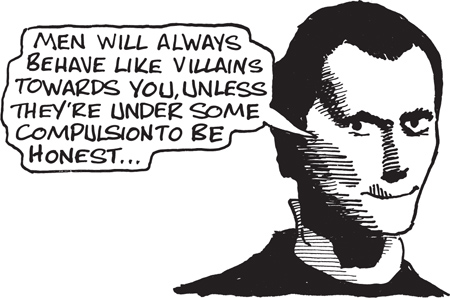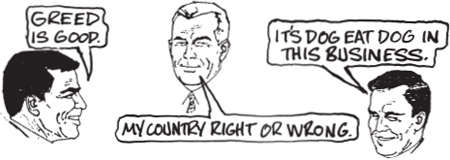
YES MATE? PSST! 10 like a copy of the book formerly known as ‘The prince’ in a plain brown wrapper please.
The interest in the relationship between morality and the State continued during the Renaissance, and its most famous writer on this topic was Niccoló Machiavelli.
Machiavelli (1469–1527) was born in Florence, a City State like Athens, although governed somewhat differently. Machiavelli was a practical diplomat rather than a philosopher. His famous book is called The Prince, and was one of the first ever to be placed on the Catholic Church’s Index of Forbidden Books.

YES MATE? PSST! 10 like a copy of the book formerly known as ‘The prince’ in a plain brown wrapper please.
The Prince is ostensibly a technical book on politics but its subtext is definitely ethics. What Machiavelli points out is that all good rulers need virtù –the “masculine” qualities of self reliance, courage, resoluteness and so on. However, to be a really successful ruler also means going in for “necessary immorality”. A prince must lie, betray, cheat, steal and kill.
“It is necessary for a prince who wishes to maintain his position to learn how not to be good…”
Machiavelli then describes some of the rather un-Christian ways in which Cesare Borgia operated: he didn’t think it was always necessary to keep promises or tell the truth; he invited rebel soldiers to dinner and then had them strangled; he appointed a cruel deputy to enforce his own laws, whom he then executed.
Readers of Machiavelli’s book have always argued over it. Some, like the Catholic Church, believed it to be a wicked book, others think it is a satire, others say it is not a moral or immoral book but a “technical” book. However, there’s not much doubt that Machiavelli admired successful princes in spite of their methods. He was, like Hobbes, fairly pessimistic about human nature. He thought princes had to be immoral.

Men will always behave like villains towards you, unless they’re under some compulsion be honest…
The Prince is important, not because it offers any great philosophical insights into ethics, the individual and governments, but because of the way it has helped to establish a climate of opinion which suggests that there is inevitably a difference between private and public morality. (Sometimes associated in people’s minds with “female” and “male” ethics, of which more later.) Many people today still believe that you have to be pragmatic and prudent or “unethical” in political life, business dealings and the public sphere generally. There have to be two sets of moral standards.

Greed is good. It’s dog eat dog in this business. My country right or wrong.
Machiavelli thought politics and morality were awkward companions.